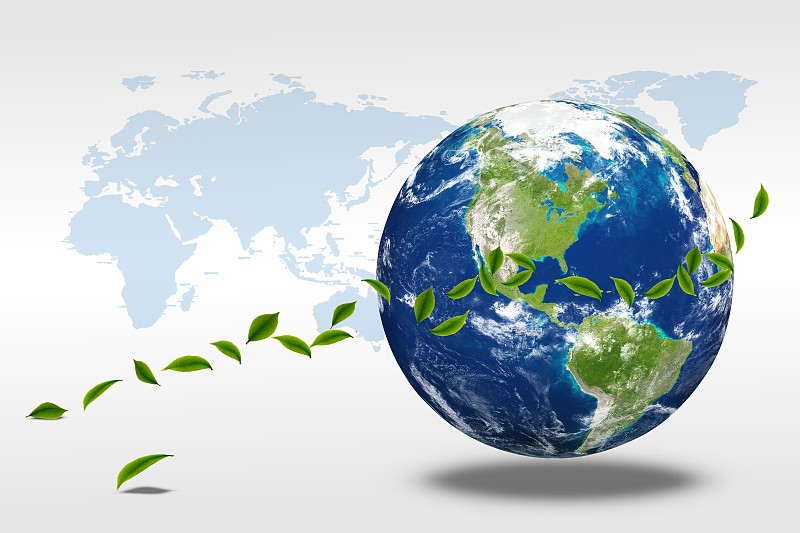Chinese State Councilor and Foreign Minister Wang Yi made it clear in his remarks at the reception commemorating the 20th anniversary of the Forum on China-Africa Cooperation (FOCAC) on Nov 12 that China is ready to work with Africa on a framework of strategic cooperation on climate change to jointly tackle this challenge.
Just several days before his speech, scholars from China and Africa who attended the 3rd sub-forum on “China-Africa Cooperation on Climate Change” of the 9th China-Africa Think Tank Forum held in Beijing on Nov 5-6 also called on both sides to fight climate change together. In fact, China and Africa have made cooperated on climate change in the past few years.
Though Africa generally contributes less to total global greenhouse emissions (4 percent or so), the scale of climate change impacts on Africa is devastating and will be even more significant in the future.
The impacts of climate change in Africa are so worrisome that studies have considered the continent as the most vulnerable in the world. For instance, six of the 20 countries that are most vulnerable to climate change are African.
According to UN Environment Program, global warming of 2˚C would put over 50 percent of the continent’s population at risk of undernourishment. Projections estimate that climate change will lead to an equivalent of 2 percent to 4 percent annual loss in GDP in the region by 2040. Assuming international efforts keep global warming below 2°C, the continent could face climate change adaptation costs of $50 billion per year by 2050.
Most common climate events in Africa are drought, flooding, desertification and land degradation. According to the research, climate change in Africa has caused and will cause great adverse effects on infrastructure, agriculture and food security, human health and access to water.
Climate change in Africa also has resulted in the forced migration and even conflicts in some parts of Africa, seriously threatening the political and economic stability and in turn damaging the sustainable development in Africa. Just as the message from Dr. Donald Kaberuka, president of the African Development Bank Group, said, “We have two challenges, fighting global poverty and fighting climate change. Fail the one, fail the other.”
The implication of climate change on development makes both mitigation and, in particular adaptation, essential to responding to the impacts on climate change. China has made great efforts in improving the capacity for climate change adaptation and mitigation and for sustainable development in Africa.
China and Africa have a long history of cooperation. The building of the China-Africa Community with a shared future and the synergy of the BRI with the 2063 Agenda of the African Union and the national strategies of the African countries provide more opportunities of the cooperation on climate change. China has indeed implemented many climate change cooperation programs with African countries under the China’s Africa Policy and the Action Plans of the FOCAC.
For example, China’s Africa Policy Paper published in 2006 states China will promote cooperation with Africa on climate change by increasing scientific and technological cooperation. China’s second Africa Policy Paper published in 2015 stipulated cooperation on climate change as being one of the six areas for which China’s assistance would be primarily used, and that China will boost and consolidate cooperation with African countries under the UN Framework Convention on Climate Change (UNFCCC).
In 2009, China and African countries agreed to include cooperation on addressing climate change as one of the new areas for cooperation under the FOCAC. Since then the Action Plans adopted in the following FOCACministerial conferences all contained the provisions on climate change cooperation between both sides.
From past experience, China-Africa cooperation on climate change focuses mainly on the financing, climate infrastructure building and capacity building, as well as the development of green and renewable energy for African countries.
Since 2013, China has been building climate infrastructure in some African countries, such as Zimbabwe, Kenya, Namibia and Cameron, including the building of a weather station, satellite data processing system and weather observation system.
China also launched weather satellites for some African countries, such as Nigeria, Algeria and Ethiopia, to conduct climate change research and weather forecasting.
Over 700 people from Africa have attended training courses on weather technology in China and 200 African students have been awarded a Chinese government scholarship to study meteorology in China since 2002.
China has implemented projects on green and renewable energy with Guinea, Sudan, Tunisia, Ethiopia, Morocco and South Africa, among other countries.
To consolidate cooperation on climate change between China and Africa in the long run, China and Africa may strengthen their cooperation under multilateral, regional and bilateral frameworks and enhance cooperation in domestic law and policy-making on climate change.
China and African countries are all developing countries and undertake the common but differentiated responsibility under such international conventions on climate change as the UNFCCC, Kyoto Protocol and the Paris Climate Accord.
As developing countries, they hold common positions on climate change that will make it easy for them to cooperate in the international arena on climate change. The establishment of the UN Environment Program China-Africa Environment Cooperation Center is a good example and it will become a platform for broad environmental policy dialogue, information exchange, capacity building and co-operation on green development, directed and steered by both African countries and China.
To fight climate change, many regional initiatives in Africa have been set up in recent years and China may consider cooperating with them. For example, the China-Africa Renewable Energy Cooperation and Innovation Alliance, a coalition of financing institutions, smart grid providers and core manufacturers, on 31 August 2017, signed a Memorandum of Understanding on cooperation with Africa Renewable Energy Initiative. China also may discuss cooperation with the African Ministerial Conference on the Environment (AMCEN) on climate change in Africa.
The existence of AMCEN has had an impact on the manner in which environmental issues are being handled in the region. AMCEN has also contributed to strengthening Africa’s participation and active involvement both in global negotiations and in international agreements on the environment.
As regards the bilateral cooperation on climate change, China has signed bilateral agreements on “Complimentary Supplies for Addressing Climate Change” with Benin, Burundi, Cameroon, Egypt, Ethiopia, Ghana, Madagascar and Nigeria. In the future both sides may work together to conclude more bilateral agreements on specific issues on climate change. Compared with multilateral agreements, it is comparatively easy to conclude a bilateral agreement just between two sides.
And lastly, China and Africa may exchange views on law and policy-making in fighting climate change. China has put forwarded some important ideas about environmental protection, for example, the idea that green hills and clear waters are golden and silver mountains and the idea of the building of the community of humankind with a shared future, and has made great achievements in the domestic legislation on climate change. Many African countries have long traditions and wise philosophy in protecting environment and some have made specific legislation on climate change. Therefore, both sides can join hands to improve legislation and policies on climate change.
Zhu Weidong is professor and director of the Center for African Laws, China-Africa Institute.
China Daily
 Africa -China Review Africa -China Cooperation and Transformation
Africa -China Review Africa -China Cooperation and Transformation

